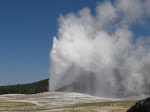"Long-term access to government publications is an important component of our democracy and likewise is an important responsibility of government information librarians" (Murray, et al., 2008, pp 66). Everything from the US Geological Society to the Supreme Court utilize archives and attempt to provide free access to them electronically, via the web. The only downside to internet archives are the extensive amount of work to be done to make the goal a reality.
To produce a document online, involves processing the document, digitalizing the format it is in (whether that be through .pdf, .jpg, or anything else offered), organizing the collection, creating an online search and organization tool, and then publishing the document in its new format to the electronic outlet. A digital archives project, depending on the scale of the project, can take years.
Of course, that is only one type of web archiving. The other option, is to archive any and all web published documents, that may or may not also be available in print editions. "Limitations posed by librarians' current abilities and resources make it difficult for them to meet the challenges that accompany the preservation of Web publications. Web archiving may provide a solution for
the acquisition and preservation of Web-published government information and enable longterm information access for a wide-range of citizens, residents, and communities" (Murray, et al, 2008, pp 66-67).
The number of Americans with regular access to computers and the internet has grown considerably over the past decade. Traditionally it is hard for rural communities to have access to the necessary tools to further their individual and collective knowledge; libraries can play an important role in this area, by supplying the internet. “The Internet has the potential to change rural life, which historically has been isolated economically, socially and politically” (Boris, 2005, pp 4). Library implementation of computers and internet access grants rural citizens a chance to keep up with the pace set by urban societies. The information age began in the late 1990’s and seems to have no inclination of slowing down, let alone stopping. Luckily, 90% of all rural libraries in the U.S. have internet access (Flatley, 2001, pp 7).
Sources:
Boris, L. (2005). The Digital Divide and its Impact on the Rural Community. Rural Libraries, 25(2), 7-35.
Flatley, R. (2001). Rural librarians and the Internet: a survey of usage, attitudes, and impact. Rural Libraries, 21(1), 7-23.
K.R. Murray, I.K. Hsieh. (2008) "Archiving Web-published materials: A needs assessment of librarians, researchers, and content providers". Government Information Quarterly. 25. pp 66-89 Retreived on April 13, 2008 from HW Wilson Online, http://vnweb.hwwilsonweb.com.proxy.usf.edu/hww/results/results_common.jhtml;hwwilsonid
=R3TLENB3MX5ZXQA3DILCFGGADUNGIIV0
Subscribe to:
Post Comments (Atom)





2 comments:
It is fascinating to see how the Internet has expanded to rural areas.
I think that it is great that things such as government documents are being internet accessible. I just hope that they are being archived in other ways also to that a digital meltdown or a hacker does not destroy all that we have.
Post a Comment